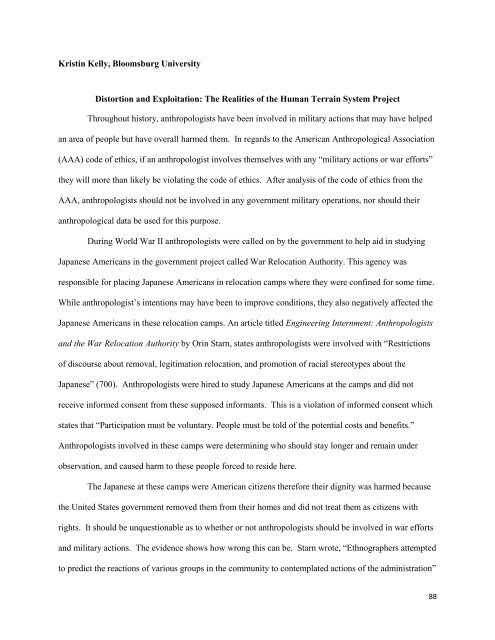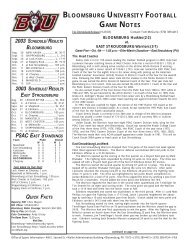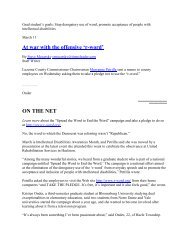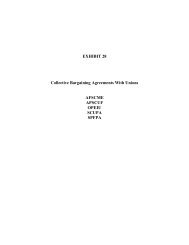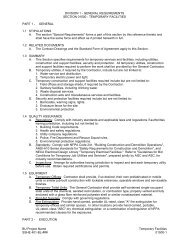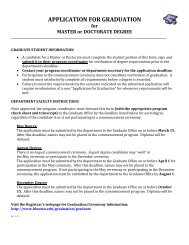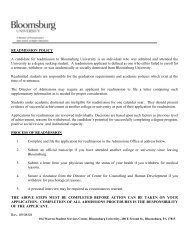Human Rights at Home and Abroad: Past, Present, and Future
Human Rights at Home and Abroad: Past, Present, and Future
Human Rights at Home and Abroad: Past, Present, and Future
You also want an ePaper? Increase the reach of your titles
YUMPU automatically turns print PDFs into web optimized ePapers that Google loves.
Kristin Kelly, Bloomsburg University<br />
Distortion <strong>and</strong> Exploit<strong>at</strong>ion: The Realities of the <strong>Human</strong> Terrain System Project<br />
Throughout history, anthropologists have been involved in military actions th<strong>at</strong> may have helped<br />
an area of people but have overall harmed them. In regards to the American Anthropological Associ<strong>at</strong>ion<br />
(AAA) code of ethics, if an anthropologist involves themselves with any ―military actions or war efforts‖<br />
they will more than likely be viol<strong>at</strong>ing the code of ethics. After analysis of the code of ethics from the<br />
AAA, anthropologists should not be involved in any government military oper<strong>at</strong>ions, nor should their<br />
anthropological d<strong>at</strong>a be used for this purpose.<br />
During World War II anthropologists were called on by the government to help aid in studying<br />
Japanese Americans in the government project called War Reloc<strong>at</strong>ion Authority. This agency was<br />
responsible for placing Japanese Americans in reloc<strong>at</strong>ion camps where they were confined for some time.<br />
While anthropologist‘s intentions may have been to improve conditions, they also neg<strong>at</strong>ively affected the<br />
Japanese Americans in these reloc<strong>at</strong>ion camps. An article titled Engineering Internment: Anthropologists<br />
<strong>and</strong> the War Reloc<strong>at</strong>ion Authority by Orin Starn, st<strong>at</strong>es anthropologists were involved with ―Restrictions<br />
of discourse about removal, legitim<strong>at</strong>ion reloc<strong>at</strong>ion, <strong>and</strong> promotion of racial stereotypes about the<br />
Japanese‖ (700). Anthropologists were hired to study Japanese Americans <strong>at</strong> the camps <strong>and</strong> did not<br />
receive informed consent from these supposed informants. This is a viol<strong>at</strong>ion of informed consent which<br />
st<strong>at</strong>es th<strong>at</strong> ―Particip<strong>at</strong>ion must be voluntary. People must be told of the potential costs <strong>and</strong> benefits.‖<br />
Anthropologists involved in these camps were determining who should stay longer <strong>and</strong> remain under<br />
observ<strong>at</strong>ion, <strong>and</strong> caused harm to these people forced to reside here.<br />
The Japanese <strong>at</strong> these camps were American citizens therefore their dignity was harmed because<br />
the United St<strong>at</strong>es government removed them from their homes <strong>and</strong> did not tre<strong>at</strong> them as citizens with<br />
rights. It should be unquestionable as to whether or not anthropologists should be involved in war efforts<br />
<strong>and</strong> military actions. The evidence shows how wrong this can be. Starn wrote, ―Ethnographers <strong>at</strong>tempted<br />
to predict the reactions of various groups in the community to contempl<strong>at</strong>ed actions of the administr<strong>at</strong>ion‖<br />
88


